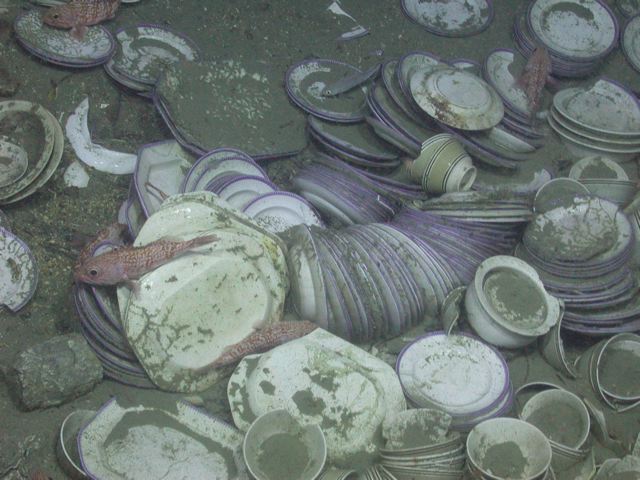I've been diving since 1963.
我1963年就開始潛水了。
I still get that thrill. When I jump off the boat in the water.
即便是今天,從船上跳入水中的那一刻,我還是能感覺到那種興奮。
I look at the shipwreck.
看著沉船的殘骸,
I think about the history it represents.
我就會想到它代表的歷史。
It's a thrill.
特別刺激。
I only champion the cause of protecting shipwrecks
我聲援保護沉船大計
to let people appreciate that a shipwreck is really in the environment;
只是為了讓大家意識到,這些殘骸在我們的環境中是確實存在的,
it's part of the environment that need to be protected and they ought to be accessible to the public to appreciate ‘em.
它們是需要保護的整個環境的一部分,所以我們應該讓公眾有機會欣賞它們。
My name is Professor Charles Beeker.
我是查爾斯·比克爾教授。
I'm an underwater archeologist and a specialist for marine-protected areas.
我是一名水下考古學家,也是研究海洋保護區的專家。
Hold on to that sucker.
抓穩了。
I got a chance to go scuba diving and immediately fell in love with it.
當初我也是偶然有了一個潛水的機會,但那之后我很快就愛上了這項運動。
Bought my first equipment in 1966.
1966年我買了我的第一套潛水裝備。
By the ‘80s, I got involved in academics, and I realized that these shipwrecks are really finite.
到了80年代,我開始研究學術,結果發現學術領域關于這些沉船的資料非常有限。
Going in.
我下去了。
They're a porthole to our past.
但它們是我們窺探歷史的一個窗口。
This is a one-time event,
沉船事故都是一次性事件,
and it's a trapped fragment of life for the people on board a ship when the shipwreck goes down that tells us about that time period.
那些殘骸都是船在下沉的時候船上的人生命被困時留下的一些,能夠帶我們回到那段時間的碎片。
We're at the Underwater Cultural Patrimony Conservation Laboratory.
歡迎來到水下文化遺產保護實驗室。
This is the national laboratory that is involved with the conservation of the artifacts that are brought up.
這是一個致力于保護被我們打撈起來的那些文物這一工作的國家級實驗室。

This is just a fantastic object from the days of Columbus.
這是哥倫布大航海時代留下的一個非常神奇的東西。
This is a sundial and you can see the markings on the dial, the Roman numerals.
它是一個日晷,你可以看到刻度盤上刻著的羅馬數字。
What I saw was numerous shipwrecks that were heavily impacted by either hobby divers or professional salvage operations.
我所看到的,是無數的沉船殘骸都已經受到了業余潛水愛好者或專業打撈人員的嚴重影響。
You go to the actual sites and what you find there is relatively little left.
到那些現場去看一看,你就會發現原來的東西幾乎已經所剩無幾了。
If everybody went out and picked up one object,
如果每個人都下去撈一件東西,
there wouldn't be anything left for us to see in the future.
將來我們就沒有什么可看的了。
These shipwrecks really deserve being protected.
這些沉船確實是值得保護的。
I've really spent my time trying to look at a way
我也花了很多時間來研究保護它們的方法,
and make sure that another 30 years from now others will have a chance to see these finite resources.
確保30年后,后輩們還有機會看到這些有限的資源。
I've been coming here to the Dominican Republic to work with the government to establish our first living museum site.
我來多米尼加共和國就是為了和當地政府通力合作,創建一個史無前例而又生氣蓬勃的博物館。
We're showing that alternative to taking these sites and turning them into a resource that's recognized and will be protected,
我們想展示的是,除了把那些殘骸變成一種被攫取繼而消失在茫茫人海的資源,
rather than a resource that's going to be harvested and disappear.
我們還能把它們變成一種被認可,被保護的資源。
And are you ready?
準備好了嗎?
These sites are going to last.
這些網站會流傳下去。
They will be around.
它們會一直在這個世界上。
They're not going away.
不會消失。
I'll be gone, they'll still be here, and that's really a contribution I'm very proud of.
我會離開這個世界,但它們會繼續留在這里,能為社會做出這樣一份貢獻我感到非常自豪。











